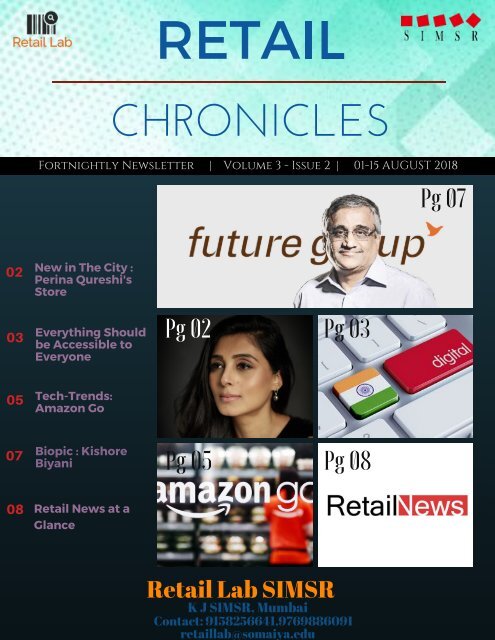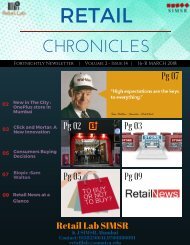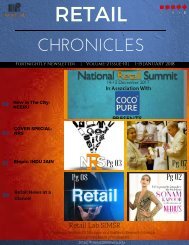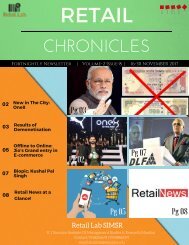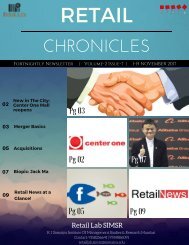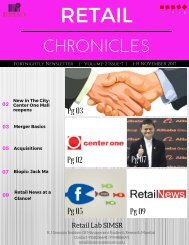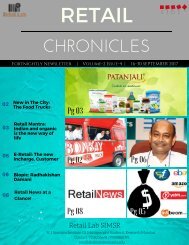Retail Chronicles- August
Create successful ePaper yourself
Turn your PDF publications into a flip-book with our unique Google optimized e-Paper software.
in The City :<br />
New<br />
Qureshi's<br />
Perina<br />
Should<br />
Everything<br />
Accessible to<br />
be<br />
Tech-Trends:<br />
Go<br />
Amazon<br />
: Kishore<br />
Biopic<br />
Biyani<br />
News at a<br />
<strong>Retail</strong><br />
Glance<br />
<strong>Retail</strong> Lab SIMSR<br />
K J SIMSR, Mumbai<br />
Contact: 9158256641,9769886091<br />
retaillab@somaiya.edu<br />
RETAIL<br />
CHRONICLES<br />
Fortnightly Newsletter | Volume 3 - Issue 2 | 01-15 AUGUST 2018<br />
Pg 07<br />
02<br />
Store<br />
Pg 03<br />
Pg 02<br />
03<br />
Everyone<br />
05<br />
07<br />
Pg 08<br />
Pg 05<br />
08
THE ENTREPRENEUR ALWAYS<br />
SEARCHES FOR CHANGE, RESPONDS<br />
TO IT, AND EXPLOITS IT AS AN<br />
OPPORTUNITY.<br />
PETER DRUCKER
02<br />
NEW IN THE CITY<br />
Pernia Qureshi launches first brick-and-mortar store in Mumbai<br />
Entrepreneur Pernia Qureshi is all set to elevate the<br />
brand’s offline presence with the launch of maiden<br />
flagship store in Mumbai. The Pernia’s Pop-Up<br />
Studio located in Juhu is spread over 1,500 sq ft<br />
area and aims to create a tailored shopping<br />
experience integrated with its e-store. Shoppers can<br />
browse their website via in-store touch screen<br />
kiosks to explore collections beyond the curated mix<br />
of industry veterans and upcoming designers<br />
housed in the studio.<br />
Most of the brand’s collections are trans-seasonal,<br />
but it mainly focuses on Indo-western styles with a<br />
festive flair this season. The designer selections at<br />
the store will change every week with labels like<br />
Dhruv Kapoor, Nishka Lulla, Pernia Qureshi label,<br />
Pallavi Jaipur, Pink Peacock Couture, Samant<br />
Chauhan and Eurumme, adorning its racks.<br />
The store’s lounge section will focus on personal<br />
styling consultations while Qureshi’s top picks of the<br />
month are also showcased on a dedicated shelf.<br />
Our favorite element in the studio is the impressive<br />
7 by 10 ft. wall with a video display of new<br />
collections. Here’s how it works; Browse through<br />
Pernia’s online selection, conceptualize a<br />
personalized look and select your preferred choice<br />
across two big touchscreens enabled kiosks.
Everything should be<br />
accessible to everyone<br />
Digital India can connect rural areas with highspeed<br />
Internet networks, allowing e-commerce to<br />
reach various parts of India, which are currently<br />
served only by unorganised retail. Apart from<br />
reaching out to customers, entrepreneurs from the<br />
interiors can join the organised retail industry and<br />
scale up businesses to pan-India.<br />
It was not very long ago that people who shopped<br />
online in India were considered 'ahead of time'. But,<br />
times have changed, and in today's world the<br />
question isn't "Have you ever shopped online",<br />
“How often you shop online." We can say with<br />
certainty that e-commerce has indeed arrived in<br />
India, bearing in mind that we still have a long way<br />
to go.<br />
Notwithstanding the phenomenal growth during the<br />
last two years, online shopping still represents a<br />
minuscule 1% of overall retail sales in India. By<br />
2020, India's e-commerce market is expected to<br />
reach $100 billion, and there is no doubt this sector<br />
will greatly contribute to the Indian economy. The e-<br />
commerce industry in India is still in a nascent<br />
stage. To start with, in India there are 180 million<br />
Internet users and a small portion of them has the<br />
access to data connections. The e-commerce<br />
industry will grow further with rising disposable<br />
incomes, affordable access to data, and higher<br />
mobile penetration.<br />
It is time to re-look at regulations for digital<br />
companies from a different lens. The policies and<br />
frameworks that were designed for brick-and-mortar<br />
businesses many years ago need a fresh evaluation<br />
for digital companies. Hopefully, the expected<br />
announcements related to the Goods & Services Tax<br />
(GST) will result in simplification and standardisation<br />
of the tax regime for digital companies.<br />
Just like a new house needs a strong foundation, the<br />
e-commerce industry still needs a well-developed<br />
ecosystem in India. Last mile delivery is one of the<br />
weakest links that is limiting the reach to rural India.<br />
Therefore, any tax subsidies for logistics companies<br />
that would help develop this ecosystem would in turn<br />
help fuel the growth of e-commerce in India. In the<br />
area of fashion e-commerce, one specific opportunity<br />
is around standardisation of sizes of clothing<br />
products. This would make shoppers more<br />
comfortable buying online. However, this type of<br />
initiative requires investment from the government<br />
into an independent body that sets such standards<br />
across the industry. There is also an opportunity to<br />
simplify regulations for international brands to do<br />
business in India.<br />
03
04<br />
Apart from reaching out to the customers, many<br />
enthusiastic entrepreneurs from the interiors of<br />
India can join the organised retail industry and<br />
scale up their businesses to pan-India. Hence, it<br />
would be instrumental in bringing the best of<br />
different parts of India to the entire population of<br />
the country. The best of the collections and niche<br />
offerings will be available to everyone at their<br />
fingertips. This would make "everything<br />
accessible to everyone" and truly foster growth for<br />
the 'Make in India' campaign.<br />
The e-commerce industry would also nurture<br />
many more allied industries with expertise in the<br />
e-commerce domain, such as logistics,<br />
warehousing, mobile marketing, etc, serving e-<br />
commerce companies. E-commerce is definitely<br />
going to encourage small and talented<br />
entrepreneurs to dream big and would vicariously<br />
facilitate 'Make in India'. Virtually, everything we<br />
need - be it a product or service - would have a<br />
potential to come online with a higher value<br />
proposition of "convenience".<br />
Last, with the high penetration of smartphones in<br />
India and due to the affinity of users to do many<br />
things on the go, there is an affinity for mobile<br />
apps. This provokes digital companies to gain a<br />
share of space in a consumer's mobile through<br />
apps, which can generate higher engagement with<br />
consumers. Having the mobile app on consumer's<br />
mobile also increases the brand preference score of<br />
the company.<br />
There are many more innovations expected in the<br />
mobile engagement sector and this could be by<br />
making navigation easiest and fastest, offering<br />
customised recommended content depending on<br />
past behaviour of that particular customer till the<br />
point it becomes a one-stop personal assistant for<br />
that category. There are many other innovations<br />
expected too, such as experimentation with<br />
augmented reality which would offer realistic but<br />
virtual trial rooms to every user and could enrich the<br />
experience of the consumers buying online.<br />
To • sum it up: there is no question that e-commerce<br />
is here to stay and thrive in India. However, the<br />
upcoming policy announcements and innovations<br />
will play a crucial role in impacting this growth over<br />
the next few years.
05<br />
Tech- Trends:<br />
Amazon Go Means Goodbye Status Quo<br />
Amazon Go is quite simply awesome. It is a<br />
welcomed consumer experience, and, more<br />
importantly, it may just be the first step on the path<br />
to a new American retail experience that is no<br />
longer just the stuff of science fiction movies. Here<br />
then is a quick assessment of what Amazon Go is<br />
today, what it could become, and what it all, when<br />
taken together, could portend for the future of retail:<br />
1. Amazon Go Is Urban Millennial Nirvana<br />
The Amazon Go experience in Seattle is 100%<br />
friction-free.<br />
It involves only three key steps:<br />
a). The consumer downloads an app.<br />
b). He or she scans the app's QR code on a<br />
boarding-an-airplane-like device upon entry.<br />
c). He or she then walks into the store and takes<br />
whatever he or she wants without talking to anyone.<br />
•<br />
Right now, the current Amazon Go experience is<br />
mostly prepackaged product, i.e. product that is<br />
easily identified via Amazon's visual recognition<br />
technology. The only differentiating leg on which to<br />
stand that urban convenience stores and grocery<br />
stores have against Amazon Go right now are fresh<br />
fruits, meats and vegetables.
If Amazon begins testing a consumer-first<br />
experience in any of these categories soon, the<br />
world could get topsy-turvy real quick. It would<br />
mean Amazon may be close to figuring out how to<br />
merge Amazon Go with Whole Foods and that the<br />
days of mom having to placate three-year-old<br />
Jimmy while she waits patiently for the grocery<br />
cashier to ring up her purchases might soon be<br />
over.<br />
2.The Personalized Physical Store<br />
not even started their own experimentation yet.<br />
<strong>Retail</strong> innovation cycles every 30 to 40 years like<br />
clockwork. Jeff Bezos was on the cutting edge of<br />
last great innovation: e-commerce. Based on the<br />
historical trajectory, the next innovation is due<br />
sometime between 2020 and 2030. Like Sears with<br />
its catalog and later its department store sprawl,<br />
Bezos too may be about to pull the feat off for the<br />
second time. A checkout-free, fully operating<br />
grocery store is phenomenal, but even more<br />
breathtaking is the first personalized physical store,<br />
i.e. a physical experience that is different from one<br />
individual to the next, likely in this case via<br />
Amazon's mobile applications.<br />
3. The Formula Can Go As Fast As It Wants<br />
If the above holds true, retailers will have almost no<br />
shot to do anything about it competitively. Some big<br />
guys might—the likes of Walmart, Kroger and a few<br />
others—but mostly the situation will prove too<br />
complicated for existing retailers to rewire their<br />
systems on the timelines required to meet the<br />
experience benchmarks Amazon will have set<br />
already, especially considering many of them have<br />
4. The Competition's Backs Are Up Against A<br />
Wall With Few Remaining Options<br />
History could even repeat itself. Just as in the early<br />
days of e-commerce, when retailers leveraged<br />
Amazon's platform for their digital experiences,<br />
legacy bricks-and-mortar retailers may have no<br />
choice but to leverage Amazon's future "Go"<br />
platform for their own in-store experiences as well.<br />
It is their only hope for survival. Otherwise they, like<br />
the status quo, will soon go the way of the dodo.<br />
Nice work, Amazon. You deserve nothing but<br />
accolades on this one.<br />
06
BIOPIC<br />
Kishore Biyani<br />
A true Indian retail expert, Kishore Biyani is the<br />
Group CEO of Future Group. Popularly known<br />
as KB, he is the one behind the concept of retail<br />
supermarkets in India such as Big Bazaar, Mega<br />
Mart, Pantaloon and Bangalore Central. With<br />
his ‘guts and instincts’ he created Future Group<br />
to a $1 billion enterprise and spearheaded the<br />
emergence of Pantaloon.<br />
Born on Aug, 1961 into a small malwadi traders<br />
family, he started his first business enterprise<br />
selling stonewash fabric to small shops in<br />
Mumbai. Famous for his unconventional style<br />
of running the business Biyani was initially<br />
written off by the media. He defied the status<br />
quo and challenged the conventional mind-set<br />
by significantly thinking big.<br />
A true believer in the group’s corporate credo,<br />
‘Rewrite Rules, Retain Values,’ he considers<br />
indian-ness as the core value driving the group.<br />
Pantaloon, today operates in over 85 cities and<br />
towns and 65 rural locations across India.<br />
Future Group’s retail arm has a multi-format<br />
retail strategy and some of its leading formats<br />
include Big Bazaar, Central Food Bazaar, Ezone,<br />
Home Town and Planet Sports. It also operates<br />
popular shopping portal, futurebazaar.com and<br />
rural retail chain, Aadhar. Future Group’s other<br />
businesses include financial services, brand<br />
development, insurance and logistics.<br />
Though Future Group’s core business is retail,<br />
its appetite for food is steadily increasing with<br />
Though Future Group’s core business is retail,<br />
its appetite for food is steadily increasing with<br />
newer retail formats and is scaling up<br />
operations with Foodhall, its most recent<br />
venture into the food retail, which would offer a<br />
new format to cater to the growing aspirations<br />
of the consumers. Presently, the company’s<br />
existing food retail chains comprise the nofrills,<br />
small format Kishore Biyani’s fair price<br />
stores, Food Bazaar and Food Rite. Another<br />
initiative, Future Fresh is for the supply of fruits<br />
and vegetables and is sourcing across the<br />
world, from Canada to New Zealand. The idea<br />
is to give quality and consistency in vegetables<br />
and fresh fruits in the long run coupled with<br />
world class technology and processes.<br />
He received the EY Entrepreneur of the Year<br />
Awards. In year 2006, he was awarded ‘First<br />
Generation Entrepreneur of the Year’ by CNBC<br />
Indian Business Leaders. He was also awarded<br />
the ‘Young Business Leader’ conferred by the<br />
IIM Lucknow.<br />
He has authored a book “It Happened In India”<br />
which traces his struggle, failures, restlessness,<br />
and sheer grit. Often been called ‘the Sam<br />
Walton of India,’ Mr. Kishore Biyani success is<br />
a classic example of how deep insights can<br />
create an impregnable differentiator among<br />
competition which are purely led by<br />
observations and theoretical market research<br />
reports.<br />
07
08<br />
RETAIL NEWS AT A GLANCE<br />
•Myntra has acquired Mumbai based<br />
end-to-end omnichannel platform,<br />
Pretr for retail. With this deal,<br />
Myntra has prepared itself to forge<br />
omnichannel partnerships with<br />
brands on its platform and provide a<br />
comprehensive solution to retailers to<br />
enhance their own omnichannel<br />
journey.<br />
• Amazon India is all set for ‘Amazon<br />
Freedom Sale’ from <strong>August</strong> 9 to<br />
<strong>August</strong> 12. With over 20,000 deals on<br />
Smartphones, Consumer Electronics,<br />
Fashion, Large Appliances, Groceries<br />
& Daily essentials, TVs and more.<br />
•Bengaluru-based company Flipkart is<br />
planning to take on its business rival<br />
Amazon's flagship subscription<br />
service Prime by introducing a loyalty<br />
programme Flipkart Plus. This is the<br />
biggest decision taken by Flipkart<br />
since its majority share was bought<br />
by Walmart in May.<br />
•Paytm has planned to launch a “New<br />
<strong>Retail</strong>” model to make shopkeepers<br />
technology enabled, logistics and<br />
marketing capabilities. According to<br />
One97 Communications, under the<br />
new model, “consumers will soon be<br />
able to discover nearby pharmacies,<br />
groceries and other shops to place an<br />
order and get instant deliveries”.
Our Team<br />
Content<br />
<strong>Retail</strong> <strong>Chronicles</strong> is a bi-monthly newsletter of<br />
<strong>Retail</strong> Lab, the <strong>Retail</strong> committee of KJ<br />
Somaiya Institute of Management Studies<br />
& Research, Mumbai. Images used in <strong>Retail</strong><br />
<strong>Chronicles</strong> are subject to copyright.<br />
Raveena Gupta<br />
Aditi Barde<br />
Vikas Khetan<br />
Design Team<br />
Debashish Sarmah<br />
Devesh Shukla<br />
Nivya Shah<br />
/retaillabsimsr<br />
@<strong>Retail</strong>_LAB<br />
retail_lab<br />
K J Somaiya Institute Of<br />
Management Studies & Research,<br />
Mumbai<br />
retaillab.simsr@somaiya.edu<br />
+91 8108908038<br />
+91 7727936906


